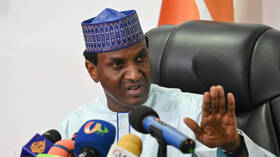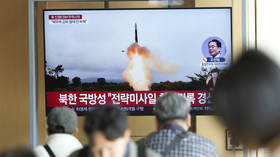African state reveals why it canceled defense deal with Washington

Niger’s decision to scrap military ties with the US was in response to threats made by American officials during negotiations, the West African nation’s prime minister, Ali Mahamane Lamine Zeine, said in an interview published by the Washington Post on Tuesday.
Zeine repeated allegations that a senior US delegation, including Molly Phee – the State Department’s top official for African affairs – who was in Niamey in March to negotiate the renewal of a decade-old defense agreement, attempted to dictate which countries should be Niger’s partners.
During the meeting, Phee warned the Sahel state against engaging with Iran and Russia at levels that were unacceptable to Washington if it wanted to maintain the US as a security partner, according to the Nigerien prime minister.
Phee also threatened sanctions if Niger pursued a deal to sell uranium to Iran, he reportedly added.
“When she finished, I said, Madame, I am going to summarize in two points what you have said. First, you have come here to threaten us in our country. That is unacceptable. And you have come here to tell us with whom we can have relationships, which is also unacceptable. And you have done it all with a condescending tone and a lack of respect,” Zeine said.
Niamey’s military government canceled its security agreement, which had allowed 1,000 US soldiers and civilian contractors to operate in Niger, in mid-March, just days after the encounter with the American delegation.
The former French colony’s new authorities began reviewing deals signed with Western partners since the ouster of President Mohamed Bazoum last July. France withdrew its troops from Niger in December after Niamey ordered them out for allegedly failing to combat the jihadist insurgency in the Sahel. The authorities also accused the former colonial power of aggressive behavior and internal meddling.
Washington, which condemned the coup and joined Paris and other allies in suspending aid to Niamey, had previously ruled out disengagement from Niger, which is crucial to its counterterrorism mission in the Sahel region.
Zeine told the Washington Post that Niamey’s authorities were “bewildered” that the US insisted on keeping its troops in the country while denying Nigerien troops additional support, including military equipment to counter extremist attacks.
“The Americans stayed on our soil, doing nothing while the terrorists killed people and burned towns,” Zeine said.
“It is not a sign of friendship to come on our soil but let the terrorists attack us. We have seen what the United States will do to defend its allies, because we have seen Ukraine and Israel,” he added.
The landlocked country has turned to Moscow for security assistance, with US Secretary of Defense Lloyd Austin confirming earlier this month that Russian forces were sharing a base with American troops in Niger. Russian military instructors are reportedly in Niamey to train the national army in counterterrorism tactics, as American troops are scheduled to leave the African country in the coming months, as demanded by the government.












